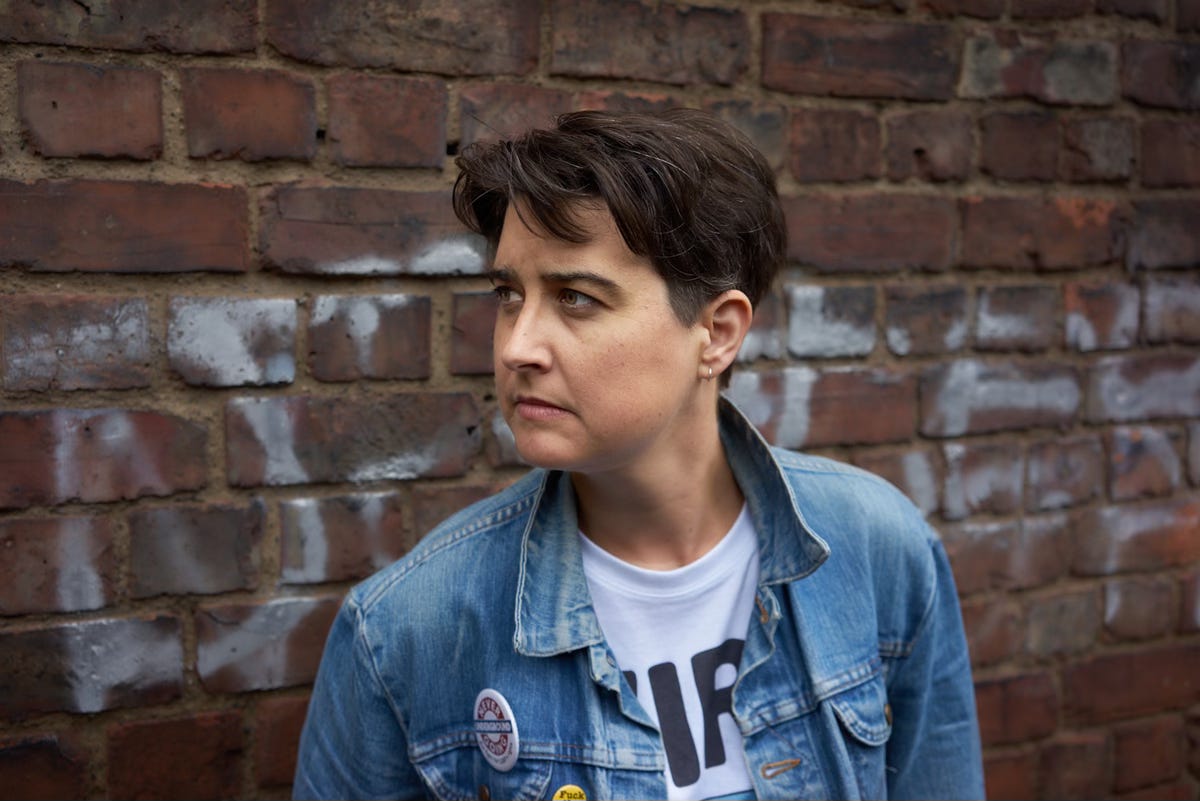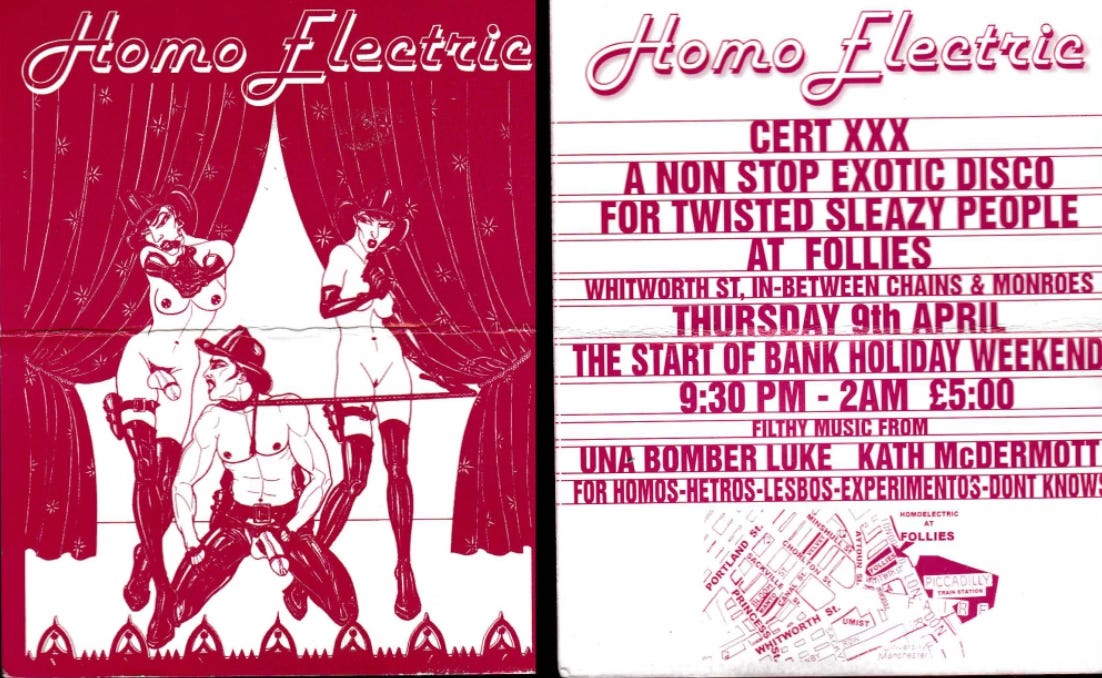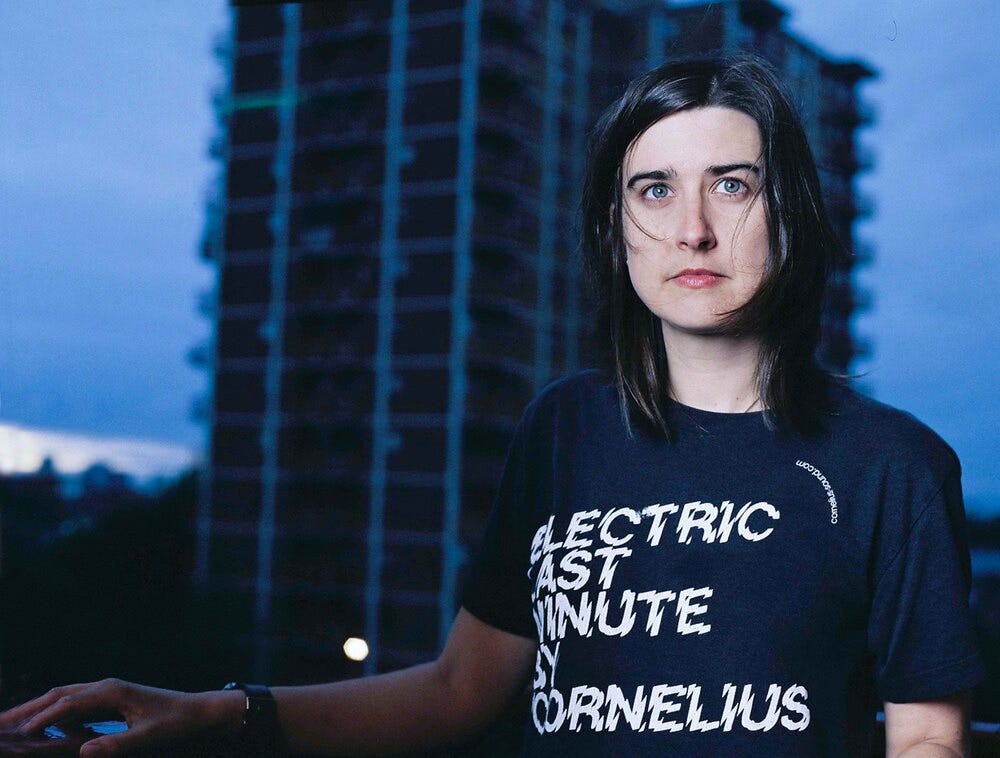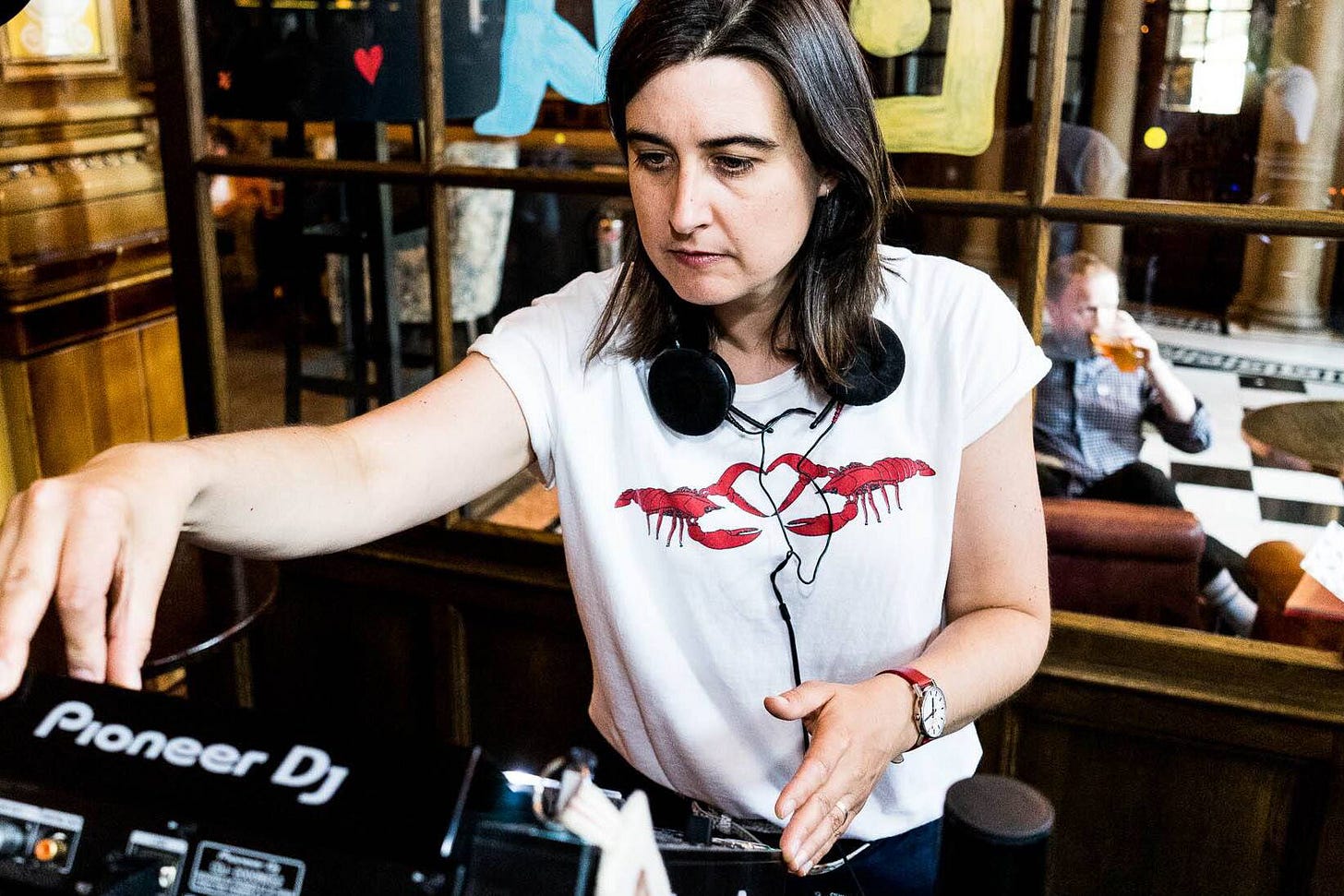#12 Deeper Into Outer Space | Abigail Ward | Ghost Assembly
Dance music historian, DJ and producer Abigail Ward tells us about her experiences unearthing hidden narratives in Mancunian club culture alongside her brilliant productions as Ghost Assembly…
The parties and politics of Mancunian queer nightlife have travelled some distance over the last 30 years, in part thanks to the groundbreaking work, research and music of Abigail Ward.
Abigail was one of the co-founders of Manchester Digital Music Archive (MDMArchive), an initiative aimed at unearthing fresh stories from within the city’s nocturnal landscape. She has curated exhibitions celebrating queer culture in the city, worked behind the counters of Manchester music institutions Vinyl Exchange and Piccadilly Records and more recently released, ‘I Miss Your Love’ on the mega Ruf Kutz, a yearning house banger and one of the best underground dance tracks of 2023.
“I’m a bit of a paradox really,” says Abigail. “I’ve always been fascinated by clubs and club culture, dedicated large amounts of my time to researching club life and documenting LGBTQIA+ club history in Manchester, yet I’m not the world’s biggest club queen. I’ve often found them nerve wracking spaces, and experienced anxiety about entering them, which I’ve often tried to mask with the usual lubricants”
Still, listen to ‘I Miss Your Love’ and your ears and feet will tell you that this is the work of a producer well capable of pulling on the dancefloor’s heartstrings. Moving from Preston to Manchester proved to be an important moment and way into the latter’s nightlife.
“The first Manchester club I went to regularly was Homoelectric at Follies. The Follies venue itself was a dykes’ club on Whitworth Street,” Abigail says.
“I went to the first Homoelectric there, then got sucked into going out to various clubs, Electric Chair, Robodisco, Friends and Family. That was how it all started.”
Homoelectric
Billed as a space for “For Homos, Heteros, Lesbos, Don't Knows”, Homoelectric has morphed from the queer offshoot of Luke and Justin Una’s Electric Chair to the huge and ambitious Homobloc celebration at the cavernous Warehouse Project. The club night’s journey from the fringes to one of the biggest club spaces in the UK is an intriguing one, indicative of the way queer nightlife culture is now a mainstream concern.
“The key thing with it is that it still exists,” says Abigail of the night. “It’s had to mutate to continue, there’s been a strong desire on the part of the crowd and the organisers for it to live as something that is very different to how it started.”
In the past, many establishments catering for the gay community concealed their activities from the general public, only accessible via a knock on the door and an invitation inside. Now body positivity, costumes, glamour and Instagrammable moments are key ingredients in parties like Homobloc.
“When I visit queer spaces at the moment, there is lots of sleaze and sexuality,” says Abigail. “I can see the appeal and it's brilliant that these types of parties happen. But what I kind of miss is just putting jeans and a t-shirt on and going out dancing without it having this hyper-sexualised aesthetic. I’m a hardcore music obsessive, that’s what I’m into and driven by.”
Follies, where Homoelectric first began, was the opposite of the gargantuan Warehouse Project. But whether it’s to your tastes or not, a healthy scene is arguably one populated by events of all shapes and sizes. Still, the concept of worshipping ‘the superstar DJ’ seems a little out of sync in our supposedly egalitarian world.
“One of the things I love at a club like White Hotel in Salford is knowing that the DJs are in a weird cage and you can’t see them,” Abigail says. “I have little patience with this idea that everyone in the room should face the DJ. With the big name DJ concept, I just experience the most excruciating level of boredom. It’s like spending an evening looking at spreadsheets.”
Regional identities
Manchester’s music is distinctive, with many of the city’s headline artists’ creativity stemming from a shared primordial soup. In younger, emerging generations of talent, the city is defined more by its eclecticism, from the jazz of Matt Halsall to the fiery techno of Meat Free’s Blasha and Allatt. Among an array of styles and sounds, unifying characteristics are hard to pin down.
“I don’t think there is a common sound among Manchester’s music makers but geography will always be an influence,” says Abigail. “The most porous artists will always be shaped by what is around them despite whatever they learn and acquire online.”
Today’s music producers and DJs such as Abigail have been let loose by the democratisation and accessibility of technology. Rather than working in specific studios, music can be crafted anywhere, yet this creates challenges alongside opportunities in forging genuine musical collaborations.
“It’s amazing to do projects via the internet but I usually find you can only get things to a certain stage before you have to meet up and be in the same room,” says Abigail of her own approach.
“If it’s one thing we learned in the pandemic, it’s the value of meeting up in person and how you exchange different information in a way that you can’t online. I think this is very important to any creative activity. I’m really sensitive to any environment I’m in, both as a positive and a negative.”
Ghost Assembly
Abigail lives in a tower block and utilises what she describes as “the most basic set up” to convey her ideas. She started working with a midi keyboard and various pieces of software, then got hold of a Korg drum machine. Previously, her creative ventures had been in guitar music but these latest efforts were part of a deliberate attempt to embrace more electronic sounds.
“During lockdown, I did lots of sketches of things and, every time, I would need to teach myself how to use a piece of gear and approach a technique before I was able to start anything more concrete,” Abigail says.
Initially, drawing on her love for cinema and seventies synth film scores, she pivoted towards house music without any pressures or ambitions to release this music.
“I just started putting bits and pieces together, it took me a long time as everything had to be learned,” she recalls. “If I wanted to make the vocal sample sound a certain way, I had to go through what felt like a day of brain surgery to get to grips with it.”
“It took me a really long time, then I knew I wouldn’t be able to mix it myself. But I was excited by the prospect of a fresh pair of ears working on it. Bonar Bradberry did an amazing job of helping position the track in the sonic way I wanted it to be.”
Manchester authorities
Cities across the land are grappling with how they feed and water their night time economies. Even in Manchester, where music culture is a prominent part of its DNA, there are issues with the way in which music spaces are treated and valued. The ongoing noise problems surrounding the legendary Night and Day cafe venue has been a headline news item from the last 12 months.
“In more recent years, the council has been keen to celebrate the stories around clubbing and exploit it,” says Abigail. “At the same time, they wouldn’t think twice about razing a building to the ground that has been really important in Manchester’s club life.”
As a producer, Abigail also feels it’s become increasingly difficult to track down an accessible or affordable rehearsal space or studio. This feels like a depressingly familiar story, one where those in charge like culture as a heritage item that can be safely stored in a museum - but when culture is living and breathing, they are more reluctant to get behind it.
“I think Manchester City Council want it both ways,” says Abigail. “They want to exploit it economically but don’t want to support it or nurture it to make life easier for a promoter, musician or music producer. Those things are becoming quite hard here, it’s a Tory aesthetic for a supposed Labour council.”
MDMArchive
MDMArchive was a significant undertaking for Abigail and an attempt to disrupt many of the historical narratives surrounding Manchester music. Initially utilising a small amount of funding and drawing on a few volunteers’ collections of flyers and ephemera, this was a user-led resource where people could insert their own stories.
“MDMArchive was set up to bring to life invisible histories in music and club culture,” says Abigail. “I curated several online exhibitions for the archive, including one called Queer Noise. When that project started in 2008, it was obvious to me that LGTBQIA+ club culture was being sidelined. We did a big event to launch the exhibition, and bit by bit, these narratives have started being inserted into more mainstream settings. For example, there was a recent Hacienda documentary that was a bit disappointing as it was retreading old ground, but it did take time to acknowledge and discuss the groundbreaking queer night, Flesh.”
How do the staid stories become the dominant narratives surrounding nightlife, creativity and music? Questions about who controls these are increasingly being asked, particularly as more and more books and content are created attempting to dig beyond the tired headlines to share new and previously hidden stories.
“When you’ve been around long enough, you can see how narratives form,” says Abigail. “It’s a small set of journalists who keep repeating the narrative that creates this groove that no one can get out of - particularly when they are fucking lazy. I just hope there’s a time when these things are understood better than they are now.”
Nightlife futures
So what of Abigail’s next projects? Hopefully more DJ sets, more radio (although sadly just after we spoke, Liverpool’s Melodic Distraction where she regularly hosted shows, suddenly closed) and music as Ghost Assembly.
And despite the challenges nightlife faces, she is optimistic that there will be small, exciting and soulful spaces in which to dance.
“Nightlife has an incredible spirit that cannot be contained,” Abigail says. “If it becomes difficult to do a club night in the city centre, people will still have the zeal to do it - and it will pop up like those weeds that grow through flags. It’s in these cracks where the best magic happens.”
Visit terminaljive.com for more info on Abigail’s latest projects.
Check out her productions via the Ghost Assembly Bandcamp.




